13. WESTERN RATIONALISM

AMERICAN "LIBERALISM"
CONTENTS
 Liberalism as a rising worldview Liberalism as a rising worldview
cosmology) or "religion"
 John Dewey as a founding father of John Dewey as a founding father of
American Liberalism
 Supreme Court Justice Oliver Wendell Supreme Court Justice Oliver Wendell
Holmes, Jr.
 Christianity responds Christianity responds
The textual material on this webpage is drawn directly from my work
America – The Covenant Nation © 2021, Volume One, pages 425-435.
LIBERALISM AS A RISING WORLDVIEW
(COSMOLOGY) OR "RELIGION" |
|
Liberalism as a rising worldview (cosmology) or religion
At
the same time that the concept of democracy was beginning to take
hold of the American political imagination, a new term, "Liberalism,"
was also coming into vogue. The term was borrowed in part from
the British Liberal Party which had recently switched its classical
anti-state position into a very activist or Progressivist position in
English political life. "Liberalism," as a political-social ideal
(even ideology), crossed the Atlantic and began to substitute itself
for the term "Progressivism" assigned to American political activism since
the turn into the 20th century.
Liberalism was a much more
comprehensive idea than Progressivism. Progressivism had
identified a number of programs that reformers sought to have
instituted in order to bring the nation closer to utopian
standards. Although Liberalism was also just such an idea and
action, it was more than that ... much more than that. Like the
term "democracy" (with which it identified itself closely) it was more
a world-view ... a new understanding about life and how it was supposed
to work. It was in fact (like its cousin "democracy") an ideology
bordering on being a religion held in faith by a growing number of true believers. But whereas "democracy" tended
to focus
more on
the idea of governmental reform, "Liberalism" took on for
reform all aspects of
social life – cultural, social, economic as well as political. In this it offered an even
deeper challenge to the Christian
world-view that had formed the ideological and spiritual foundation of
America since its founding three centuries earlier.
The instinctive goodness of
man
The Liberal
ideology or cosmology (world view) was that man certainly knew the
difference between right and wrong, and given the political power to do
so, would correct the wrongs he saw in life – to bring about the
right. Liberals, as Idealists, had little doubt about the basic
goodness of man – if given the right opportunities. This was a
key part of the Liberal doctrine which gathered support as the early
20th century developed.
Recasting the idea of "religion"
To
Liberals, religion1 was
viewed as a
private or personal matter – rather
than as a vital instrument of social and political action. God
was growing more distant – still lofty, but removed from the day to day
affairs of man, which increasingly were seen as man’s
jurisdiction.
Liberalism was based on the ennobling of
the idea of man – to the point of man being considered to be like God
himself, the only significant sovereign over life on this planet (the
heart of the Liberals' religion). Many Liberals (who also were
Darwinists or Marxists) were in fact even acknowledged atheists (a
religion without a personal god).
"Sin" as environmental rather than
internal to
man
As
far as the problem of human sin, Liberals certainly recognized that
there were sinners in the world. But they viewed these not as
Christians did, as a matter of intrinsic sinful human nature
manifesting itself ... but rather as the impact of environmental
factors that undermined the noble human spirit. Hunger, poverty,
disease, alcohol, illiteracy, and, most importantly, oppression by
others who had indeed fallen into the grips of evil (usually considered
the rich and powerful), were factors "external" to the spirit of common
man. These external or environmental factors however could and
should be corrected (by the reformers themselves) to bring about the
conditions that would allow fully the human powers of goodness to
manifest themselves.
Thus democracy and Liberalism grew up
together. Anything that would promote the dignity of man was
considered democracy. Liberals looked forward eagerly to the
day when common man would be freed from the shackles of antiquated
social and cultural systems – to usher in a bright, new era of human
wisdom, equality, prosperity and peace ... all summed up in the highly
emotional word "democracy."
"Democracy from above"
In this, Jefferson served as
something of a patron saint to American Liberals, who a century earlier
had expressed much the same expectations resulting from on-going and
truly revolutionary social reform ... always directed from above by
more enlightened individuals like himself. Indeed reform
directed from above ... from above because the unwashed masses were not
considered by Liberal reformers competent enough to figure out on their
own the path to utopia – and although directed from above done in
the name of "democracy" ... would always be one of the strange ironies
of American Liberalism.2
Liberalism as a
rising Humanist
religion
Liberalism
was moving itself in America into an even stronger position as a rising
religion, one entirely humanist or secular. At one point
Liberalism – or ‘Humanism’ as it also called itself – did
acknowledge
itself to be a new religion (the 1933 Humanist
Manifesto). But it
would later step away from that confession (the 1973 Humanist
Manifesto
II)... because it discovered that by denying that it was a religion,
but claiming for itself the status as mere Scientific Truth ... and by
pointing out at the same time that Christianity in the public arena
violated the Constitutional principle of the "separation of Church and
State"3 ...
it could
force Christianity out of the public life of
America and position its own "non-religion" of Liberalism (or Humanism)
in Christianity’s former position as America's foundational cosmology
or belief system, thus monopolizing American public life –
intellectually, morally and spiritually (much as the Soviets did in
Communist Russia).
All that was needed to move history into this
last, final Liberal (or Socialist) stage of man’s long development was
a "revolutionary" push.
1Meaning "Christianity" – although a religious mix of Christianity, Buddhism,
Hinduism etc. was becoming increasingly popular among the cultural
elite of the Western world.
2In continental Europe – this
same
philosophy was/is known as "Socialism."
3A "Constitutional principle" invented in 1802 by President Jefferson ...
who was not even a participant at the 1787 Convention in Philadelphia
that drew up the American Constitution. At that time of the
Convention he was away in France ... and in general was not pleased
with the Constitution in its original form anyway ... until 1800, when
he himself became U.S. President under its provisions.
JOHN DEWEY AS A "FOUNDING FATHER"
OF AMERICAN LIBERALISM |
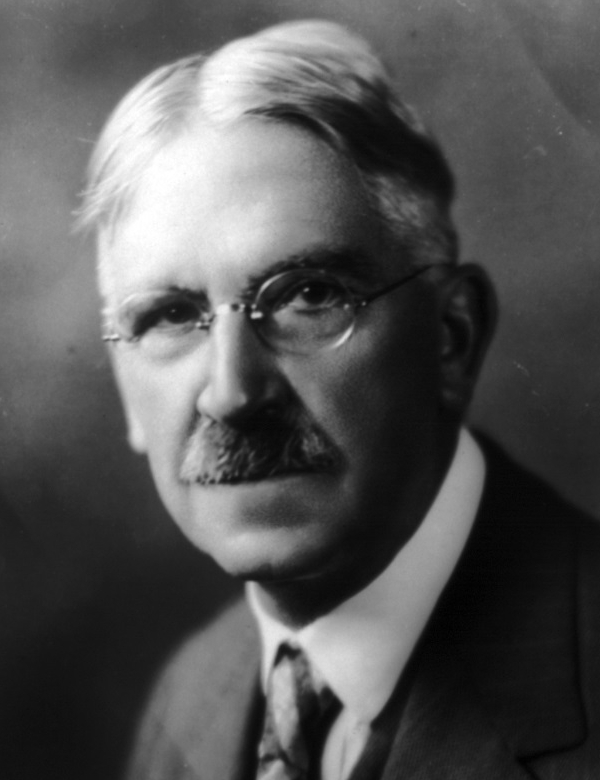 A major contributor to this Liberal sense of human confidence was John Dewey. This American
educator and philosopher truly believed in man’s natural ability
to
do the good and true if he were merely educated properly to these
higher standards. His optimism concerning human nature ultimately
had not only a tremendous impact on the way America looked at the
process of democratic education, it helped move America toward a
general Democratic Idealism that would eventually become the basis of
American Liberalism ... or Secular Humanism. A major contributor to this Liberal sense of human confidence was John Dewey. This American
educator and philosopher truly believed in man’s natural ability
to
do the good and true if he were merely educated properly to these
higher standards. His optimism concerning human nature ultimately
had not only a tremendous impact on the way America looked at the
process of democratic education, it helped move America toward a
general Democratic Idealism that would eventually become the basis of
American Liberalism ... or Secular Humanism.
Dewey grew up in a
typical middle class Vermont family in a largely unremarkable
manner. He attended and graduated with distinction (Phi Beta
Kappa) from the University of Vermont in the field of education ... and
found a job teaching high school for two years in Pennsylvania and then
a year closer to home at a primary school in Vermont. But he was
not sufficiently challenged by the work and enrolled in a Ph.D. program
at John Hopkins University in Baltimore. He then took a teaching
job at the University of Michigan in 1884 ... and then ten years later
moved on to Chicago to join the faculty of the new University of
Chicago. This innovative Baptist school was set up with major
Rockefeller funding designated for research ... also serving as the
intellectual centerpiece for a number of affiliated colleges spread
across the country. Here he often found himself working with
children alongside Jane Addams, as the University was an important
supporter of her Hull House.
The
rationalist atmosphere of the
university fit well with Dewey’s growing secular rationalism ...
labeled "Pragmatism" (or sometimes "Instrumentalism") as
a
rising
philosophical movement. Here he undertook experiments in early
education ... in accordance with his belief that early social education
could produce (by way of the pragmatic example set by the excellent
teacher) the type of rational adult that Dewey believed would usher in
a brave new world of enlightenment. Ultimately however
disagreements with the university’s directors caused him to resign in
1904, and take a position in New York City at Columbia University,
where he would remain for the next quarter of a century (except for
his two sabbatical years spent in China, 1919-1921) until his
retirement in 1930. Here at Columbia he continued his experiments
in early education and his publications in support of his
educational theories (he published some 40 books and over 700 articles
in his lifetime).
His philosophy was standard Liberal theory
(social environment determines human behavior; reform the environment
in very practical ways and you will reform human behavior). He
also, like so many intellectuals of his generation, believed that
democracy was the proper formula for solving society’s problems
(though critics were quick to point out that he never really explained
how democracy was supposed to work in a mass society). He
might not have stood out from the intellectual crowd, except that
his massive number of publications made him a well-recognized leader
in the rising Humanist movement underway in America.
After his retirement from Columbia, Dewey continued over even the next twenty
years to be very active in promoting his secular (even atheistic)
humanist philosophy, taking a position in 1929 on the board of the
Humanist Society of New York, then being one of the composers and
signatories of the 1933 Humanist Manifesto, and an avid writer and
lecturer on the subject thereafter.
Perhaps also he more
than anyone else was responsible for the split between the
growing Liberal intellectualism of the country and its long-standing
moral-spiritual foundation in the Christian faith.
|
SUPREME COURT JUSTICE OLIVER WENDELL HOLMES, Jr. |
|
 The very scholarly Supreme Court Justice Oliver
Wendell Holmes, Jr., was another major contributor to the Progressivist
Movement, who supported strongly the idea that the supreme law of the
land, the fundamental order of society, was not to be found in some
abstract set of rules put in place long ago as an absolute standard to
be followed by each and every subsequent generation. Holmes was
strongly opposed to such a fixed sense of the law … especially laws
that were supposedly required by some kind of unseen deity. He viewed
such a legal philosophy as being no more than "Legal Formalism." Today
we term this view "Legal Originalism." The very scholarly Supreme Court Justice Oliver
Wendell Holmes, Jr., was another major contributor to the Progressivist
Movement, who supported strongly the idea that the supreme law of the
land, the fundamental order of society, was not to be found in some
abstract set of rules put in place long ago as an absolute standard to
be followed by each and every subsequent generation. Holmes was
strongly opposed to such a fixed sense of the law … especially laws
that were supposedly required by some kind of unseen deity. He viewed
such a legal philosophy as being no more than "Legal Formalism." Today
we term this view "Legal Originalism."
To Holmes, a society's foundational legal
order was instead to be understood as an ever-developing foundation, a
natural byproduct of constant social development or change. Constant
changes in social circumstances by very necessity required even the
most fundamental laws to be revised according to quite practical needs
of the times, as these new social circumstances and thus social
needs came into being. In other words, the law – even the most
fundamental of all laws – ought to be whatever the political
authorities should deem it to be by the sheer necessity of the times.
And that held true especially of judges – who were given the critical
responsibility of deciding what the rightful rules and conduct and the
legal duties of all citizens should be … given the particular
circumstances that the society faced at the time. Holmes termed his
personal view of the law as "Legal Realism," sometimes also termed
"Legal Positivism."
As with all Progressivists, Holmes was
certain that common sense – at least the "common sense" of those
properly enlightened to the wiser ways of life – better served the
needs of a constantly changing world. And certainly Holmes felt that he
personally possessed all the right qualifications to understand and
thus the wisdom to decide as to which were the more "realistic" lines
and rules that a society should try to follow … and be judged by.
Holmes was born of the right
circumstances, his father (Holmes, Sr.) a well-known Boston writer and
physician, with the family also close friends with the
Transcendentalist Emerson and the famous writers Henry James, Jr. and
his brother William James. Holmes followed in his father's footsteps to
Harvard, where (like his father) he was a member of the Hasty Pudding
writers' group and the prestigious Porcellian Club. He graduated Phi
Beta Kappa in 1861 … just in time to join the Massachusetts militia and
become deeply involved in the Civil War … in the Peninsula Campaign, at
Fredericksburg, the Wilderness, Antietam, and Chancellorsville, among
other battles … being wounded on numerous occasions.
Overall, the experience determined his
view of how duty in service to society – in all its needs, but
especially its most critical needs – required a careful marshalling by
those given the responsibilities of social oversight (society's
leaders). This understanding would become the basis of Holmes's Legal
Realism.
Not surprisingly, given his mindset, he
chose to go into the practice of the law (Harvard Law School and then
private practice in commercial and admiralty law), remaining a
philosophical writer at the same time, in 1881 publishing a collection
of his lectures and writings as The Common Law. It was here that the
legal world would learn of Holmes's Legal Realism … underscoring how
judges had to make decisions on the basis of numerous factors – in a
way that made Legal Originalism "unpractical," even unserviceable.
In 1902 Roosevelt appointed Holmes to the
U.S. Supreme Court … where he got the opportunity to put his ideas to
work. But here is where Legal Realism ran into some difficulties. Even
Holmes contradicted himself as he moved from cases to cases over the
years, his "realism" inclining him first in this direction and then
later in an even opposing direction. Thus in his famous Schenck v.
United States (1919) opinion he took a stronger line in defense of the
state's rights to censor behavior than he had earlier in his dissent in
the Baltzer v. United States (1918) case when he opposed the court in
its conviction of an anti-war socialist who had been distributing
pamphlets in violation of Wilson's Espionage Act of 1917 and Sedition
Act of 1918. In the Schenck case, Holmes came down strongly in support
of state censorship, citing the state's rights in this famous comment
that the First Amendment would not protect a person "falsely shouting
fire in a theater and causing a panic." But in that same year, in the
Abrams v. United States (1919) case, Holmes now dissented from the view
that the state had the right to persecute those demonstrating
sympathies with the Russian Revolution then underway ... and who had
opposed Wilson's decision to intervene in the subsequent Russian Civil
War.
So where exactly did Holmes stand with
respect to the Espionage and Sedition Acts? That seemed to depend on
whatever Holmes was inclined to find himself at the moment. In other
words, under Legal Realism, the law was simply whatever the judges
decided it to be … under merely the immediate circumstances. Thus the
law was not really the law until the society was able to find out what
the Supreme Court justices themselves felt about matters at the time.
That's a lot of power … that answers to no one but the justices
themselves.
|
This
trend of American intellectuals to go down the road of Human Reason did
not mean that there was a widespread mood growing in America to get rid
of the idea of a God presiding over the nation, or Christ as the
designer of the moral-spiritual ideals guiding the nation. For most of
the people in the pews of the American churches, the personal
relationship with God that they held individually had not changed
substantially with all of this "higher" intellectual inquiry into the
nature and meaning of life. If anything, that relationship had deepened
as a result of the pain of going through a vicious Civil War.
However, for the more intellectually inclined, the post-Civil-War era
appeared as an age of wealth, security and leisure. For such Americans
the idea of God did not seem to have a compelling place in the new,
highly energetic, even highly competitive, social dynamic driving the
country. Science and technology seemed to offer a better path to what
faith once secured. In fact, science – not religion – was the key
identifier that Humanists applied to this rising Secular
Liberal-Democratic faith.
Science worked rationally, openly, no miracles, just hard work with
predictable results. This seemed to be a vastly better way of going at
life than expecting some peculiar intervention from a world beyond to
clear away life's hurdles. And as science was clearly leading the
country to unprecedented human progress, in the lives of the more
intellectually inclined, Christianity simply seemed to shift to the
sidelines.
A rising question of the reliability or "inerrancy" of Biblical Scripture
Ultimately,
the Liberal challenge once again raised the age-old question (since at
least the late 1600s) of the reliability of Scripture as foundational
Truth. Stories that seemed to contradict what science, or just modern
common sense, would dictate came again under attack by the more
enlightened minds.
But Scripture was the bedrock of American Protestantism. Scripture was
the final arbiter on what was Absolutely True and what was just merely
human Rationalism. It was the foundation of all that Christian
Americans held as moral absolutes. And ultimately, to Christians, it
defined the very purpose of human life itself.
Liberals, whose faith was built now on the bedrock of secular science,
naturally raised questions (and sneers) about Scripture’s tales of
changing water into wine, walking on water, raising the dead, stopping
the sun in its path, etc. Biblical miracle stories and the rules of
science clashed terribly, forcing Americans to choose on which side of
the rising controversy they stood: for the Bible of God, Christ, and
the Church – or for Science (and 20th century commonsense).
But
such attacks on Biblical faith did not occur without defenders of that
faith trying to halt or even reverse this development. Given the
serious challenge that the rising faith in science made to the old
faith in God and Christ, some Christian apologetics (written and spoken
defenses of the faith) tried to take on some of the new ideas and
attitudes to create a more comfortable fit between the old faith and
the rising world of modern science. But these ideas, however, would
trouble the Christian community itself deeply. These new ideas and
attitudes were not just a matter of new style versus old style – like
the earlier battles (during America's Christian Awakenings) between the
New Lights and the Old Lights concerning the spectacle of outdoor
revival campaigns.
Even during the days of the Civil War, Darwin's challenge to the idea
of life's divine origins as described in the Bible was finding a
strong response in numerous Christian circles. One very notable
individual in this regard was Charles Hodge,
the dominant personality at the Presbyterian seminary in Princeton all
the way up to 1878. He proudly boasted that he had held the line firmly
against the kind of theological innovation that was infecting fellow
seminarians elsewhere.
Others responded simply by taking some kind of middle road between
Christian traditionalism and rising Christian Liberalism. One of these
was Crawford H. Toy, a professor at the Southern Baptist Seminary, who
won hearts by simply focusing on the spirit of love that stood at the
heart of Christianity – rather than theological doctrine. Unfortunately
even that proved to be too much of a compromise for the otherwise
creedless Baptists, whose Convention in 1879 forced him to resign his
position at the seminary.
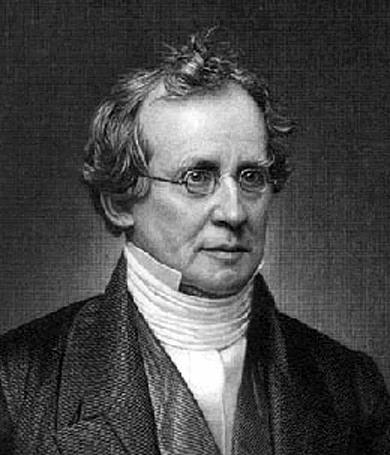
Hodge
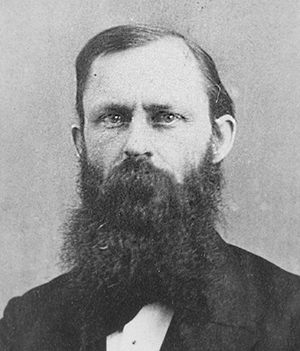
Toy
More successful in advocating a "middling" approach was Henry Ward
Beecher,107 son of the conservative Presbyterian preacher Lyman Beecher
and brother of fellow Abolitionist Harriet Beecher Stowe (author of Uncle Tom's Cabin).
As a popular pastor and circuit preacher, Beecher sidestepped the
controversial intellectual issues of evolution and Biblical
reliability, even stating at one point that he saw no problem with the
theory of evolution – as long as it understood God to be at the heart
of the process. He preached a very upbeat message of love, and a
willing accommodation to the changing industrial culture developed
around the Christian community. And he proved to be quite successful in
developing a stable Middle-Class message in the face of Darwinism's
intellectual challenge, all the way up until his death in 1887.
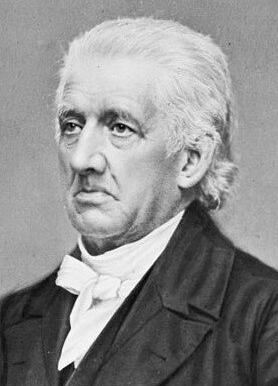
Beecher
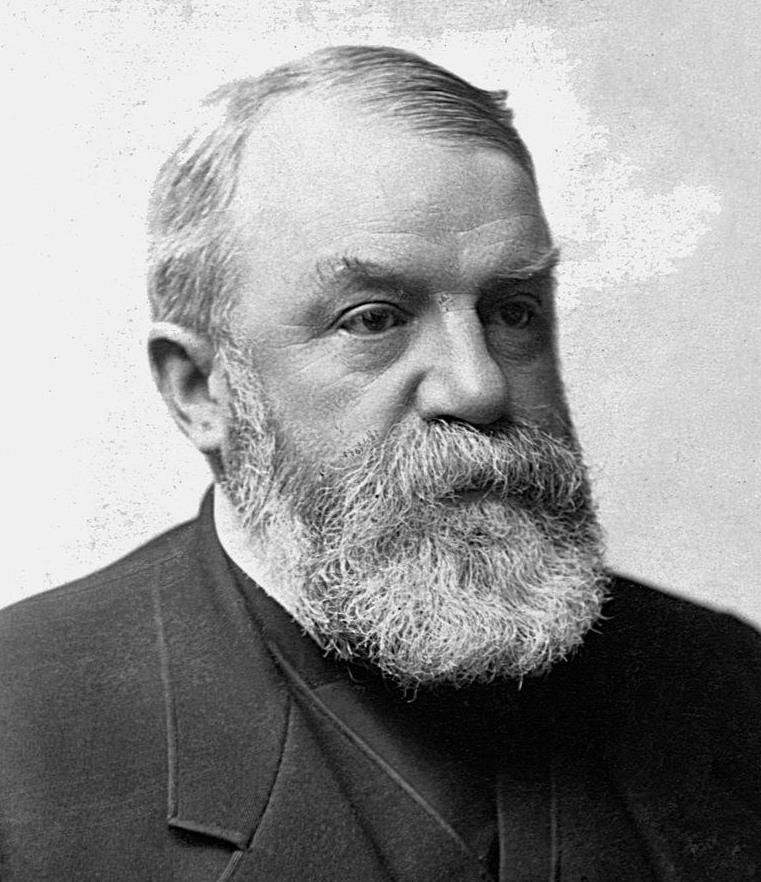
Moody
Another
individual to take something of a middling approach to the issue of
traditional theological correctness and the rising new cultural norm of
industrial/scientific Rationalism was Dwight L. Moody, circuit preacher
and simple but straightforward evangelist. Moody preached to crowds of
mostly middle-class Americans, who were simply trying to make sense of
the social changes underway in their once-familiar America. Moody was
far from being an intellectual Progressivist with a moral program
designed to make the world a better place. Nor did he have any strong
views on the burning issues of the Christian seminaries, such as
evolution or Biblical inerrancy. He was a classic premillennial who
simply looked to Jesus's second coming to clean up the mess that human
sin had made of creation. And that approach to life's challenges at the
end of the 1800s made sense to thousands of people who flocked to hear
what he had to say at his various urban rallies held around the country.
Charles Briggs and Biblical "higher criticism"
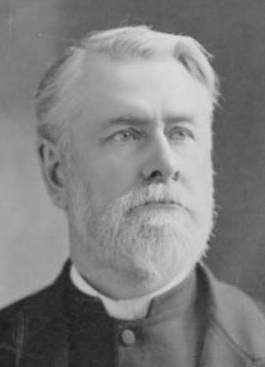 Yet
while a number of preachers were trying to find some kind of a middle
road for the "average" Christian to go down, the battle at the higher
realm of Christian intellectualism only hardened. A major contributor
to his hardening was Union Theological Seminary's professor Charles
Briggs. He even succeeded in getting himself excommunicated from the
Presbyterian denomination in 18934
because of his teachings that text-criticism or literary analysis amply
proved among other things that Moses did not actually write the first
five books of Scripture but that these writings were the result of the
much later collection of at least four different narrative traditions,
and that Isaiah did not write the entire work given under his name but
that later disciples of the Isaiah school had written the second half
of the work. Although for any who might have understood that the Jewish
Scriptures were community narrative (not "science"), such a revelation
should have come as no surprise. Biblical narrative was about finding
the path to Truth through divine inspiration, and was not assembled
anciently by those with a modern scientific worldview. Yet
while a number of preachers were trying to find some kind of a middle
road for the "average" Christian to go down, the battle at the higher
realm of Christian intellectualism only hardened. A major contributor
to his hardening was Union Theological Seminary's professor Charles
Briggs. He even succeeded in getting himself excommunicated from the
Presbyterian denomination in 18934
because of his teachings that text-criticism or literary analysis amply
proved among other things that Moses did not actually write the first
five books of Scripture but that these writings were the result of the
much later collection of at least four different narrative traditions,
and that Isaiah did not write the entire work given under his name but
that later disciples of the Isaiah school had written the second half
of the work. Although for any who might have understood that the Jewish
Scriptures were community narrative (not "science"), such a revelation
should have come as no surprise. Biblical narrative was about finding
the path to Truth through divine inspiration, and was not assembled
anciently by those with a modern scientific worldview.
But Briggs went further, even claiming that the Old Testament was
morally inferior to the moral development of modern times. This so
enraged the Presbyterian denomination that it not only excommunicated
him but moved to block Briggs' professorial appointment to the faculty
of the Union Seminary in New York City. But the seminary refused to
dismiss Briggs, and instead the seminary withdrew from the Presbyterian
denomination.
Azusa Street Pentecostalism
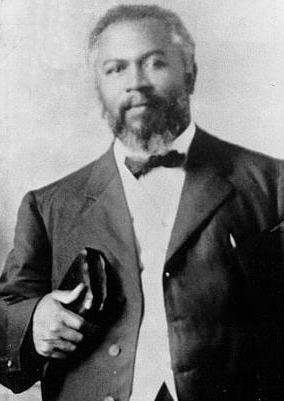 Then,
while all of this intellectual warfare was going on within the higher
reaches of Christian leadership, a strange revival (but all revivals
start out as strange events!) which exploded at the beginning of the
20th century across the Atlantic in Wales, deeply transforming Welsh
society, made its way to America – thanks to a number of Holiness
evangelists who brought the event to American shores. It dug in deeply
in California in early 1906 when strange physical healings and
"speaking in tongues" broke out at a home – when guest speaker William J. Seymour
was kicked out of church after bringing his Pentecostal message there,
and simply moved his activities to this home. The event soon drew
crowds to witness and then participate in this strange behavior, until
it became literally an on-going twenty-four- hour- a-day phenomenon.
When the crowds collapsed the porch to the house, the revival moved its
operations to a Black Apostolic Faith Mission building on Azusa Street,
making it quite inter-racial in nature as well as inter-ethnic
(Hispanics also attending), even bringing women forward to take leading
roles in the revival. Hundreds, then over a thousand individuals would
soon be attending the meetings. Then,
while all of this intellectual warfare was going on within the higher
reaches of Christian leadership, a strange revival (but all revivals
start out as strange events!) which exploded at the beginning of the
20th century across the Atlantic in Wales, deeply transforming Welsh
society, made its way to America – thanks to a number of Holiness
evangelists who brought the event to American shores. It dug in deeply
in California in early 1906 when strange physical healings and
"speaking in tongues" broke out at a home – when guest speaker William J. Seymour
was kicked out of church after bringing his Pentecostal message there,
and simply moved his activities to this home. The event soon drew
crowds to witness and then participate in this strange behavior, until
it became literally an on-going twenty-four- hour- a-day phenomenon.
When the crowds collapsed the porch to the house, the revival moved its
operations to a Black Apostolic Faith Mission building on Azusa Street,
making it quite inter-racial in nature as well as inter-ethnic
(Hispanics also attending), even bringing women forward to take leading
roles in the revival. Hundreds, then over a thousand individuals would
soon be attending the meetings.
Thus pentecostalism or the Charismatic Movement came to America. But
eventually the Azusa Street Revival would burn itself out, although it
would leave behind rather permanently a strong spiritual legacy –
occasionally picked up again here and there in 20th century America.
Most notable was the large Assemblies of God Christian denomination
formed in 1914 out of the Azusa Street Revival. The Assemblies of God
or AG Church would continue to develop pentecostalism or the
charismatic movement all way to the point today in which the
denomination has around 370 thousand congregations with over seventy
million members worldwide.
At
the same time, Christian Liberals busied themselves trying to find,
through their Social Gospel, a middle ground in the
science-versus-Christianity controversy, explaining that fact and faith
were two different things. Science dealt with fact. But faith dealt
with the question about how you handled fact. Christianity was
ultimately what you did with your life, the moral quality of the
decisions you made, especially in the social context of family,
community, nation and even the world.
Key voices in this approach to Christianity were the economist and
founder of the American Economic Association and also founder and
secretary of the Christian Social Union, Richard Ely; the
Congregational pastor, writer and ardent social reformer Washington
Gladden (considered the Father of the Social Gospel Movement of the
late 1800s/early 1900s); and Baptist pastor and seminary professor,
Walter Rauschenbusch. All three of these men were very active in their
support of Progressivist economic programming, designed to help lift
the American working class out of poverty – a very noble enterprise.
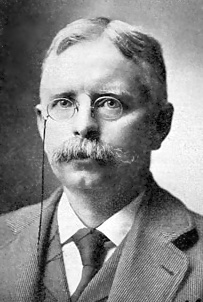
Eli
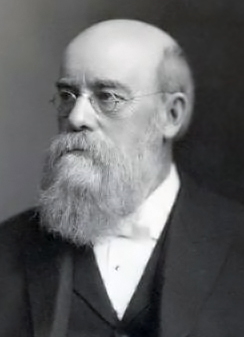
Gladden
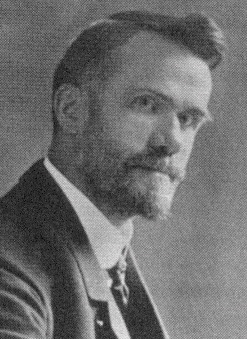
Rauschenbusch
But all of this fine work had little to do with personal salvation, the
individual "born-again" experience that comes with stepping back from
the world and its ways in order to embrace a more personal relationship
with God. Rauschenbusch was in fact very dismissive of such an approach
to Christianity, seeing the true sin that needed to be addressed by the
Christian as that of society and its cruelties.
In short, Christian Liberalism, with its Social Gospel, was largely a
matter of high social morality, the value of which one did not need to
be a Christian to appreciate. Indeed, as Liberal America opened itself
to the larger world around it, it encountered Hinduism, Buddhism,
Confucianism, all of which had different ideas about the place of God
in nature, but all of which held pretty much the same moral views on
social behavior.
Indeed,
a number of intellectuals even proposed simply to create some kind of
universal religion, combining the moral features of Christianity,
Buddhism, etc. Theosophy was just such an example – cultivated outside
America by such Humanists as the Russian occultist and author Helena
Blavatsky, her British disciple Annie Besant, and the Austrian educator
Rudolf Steiner – that was taken up in America by intellectuals seeking
to combine science and the mysticism of the world's great religions, as
a form of personal development (also very popular later in the 20th
century among very self-focused American hippies!). Thus science could
continue to pursue fact and Progressive Liberals could pursue through
private faith some kind of universal moral code, even some kind of
personal mysticism.
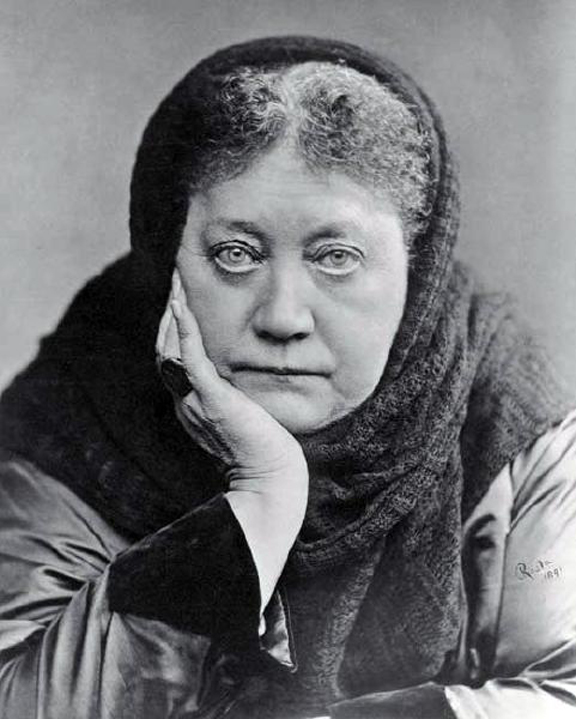
Blavatsky
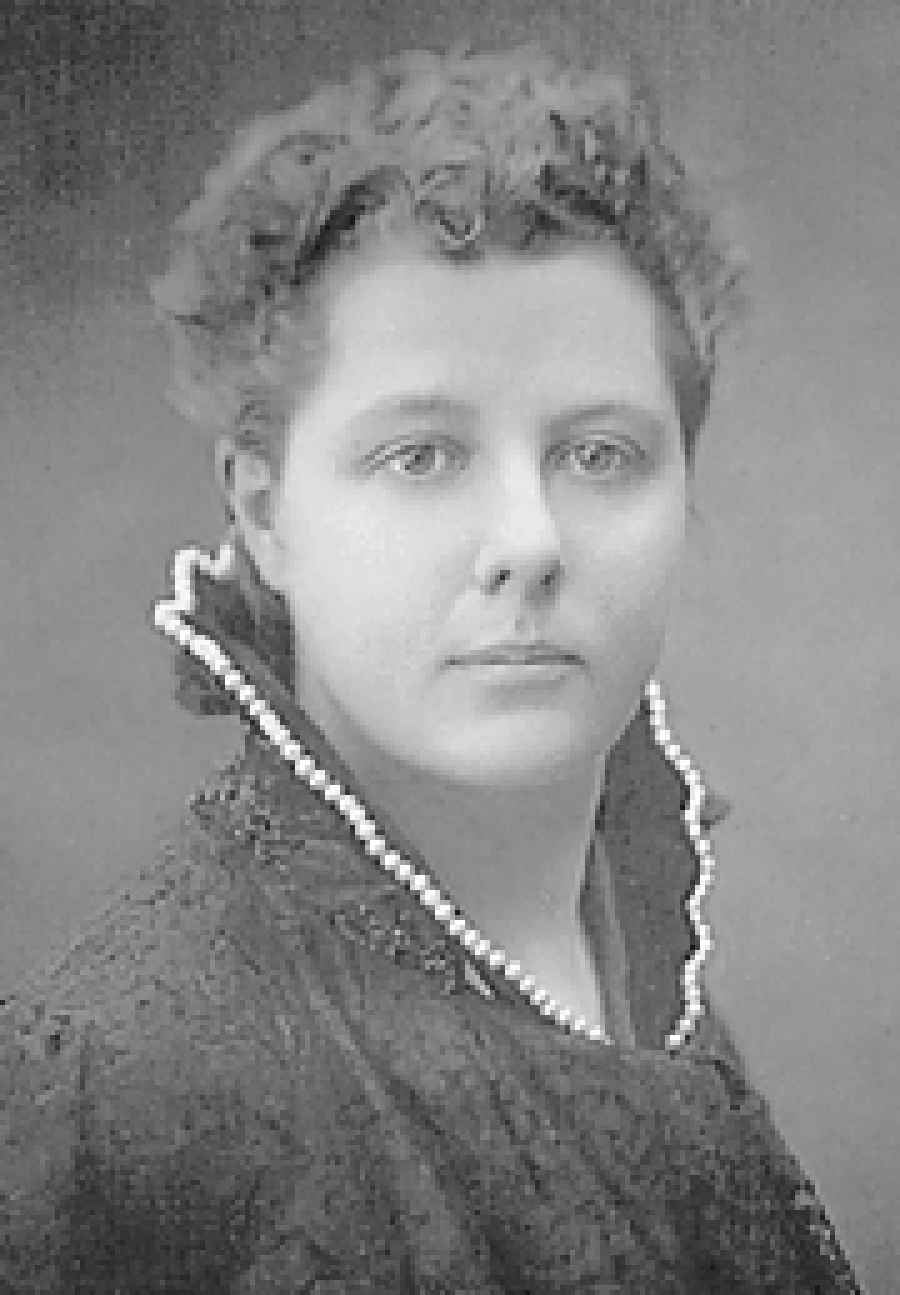 Besant
Besant
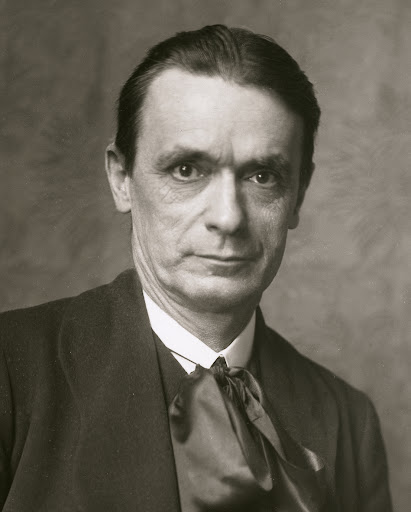
Steiner
All
of this of course was simply another version of the age-old philosophy
of Humanism (the self-sufficient enlightened individual) – pursued at
various times in history with mixed results. It was idealized during
the Renaissance, leading eventually to the corruption and ultimately
splintering of the medieval Church, and then after that the rise of
fully sovereign monarchs pursuing greedily their own dynastic fortunes,
which produced exhausting wars that accomplished nothing, until another
attempt to humanize a bankrupt monarchy in France brought forth a very
violent Revolution, and subsequently the bullying Napoleonic Empire
required to save France from its self-destructive ways (by focusing
those destructive instincts abroad). On and on it went – from one age
to the next, enlightened man about to bring the world to utopia through
clever human design and effort – ending up instead destroying huge
sections of that world.
But at the time, these memories had faded from the minds of America's
(and Europe's) rising group of Humanists, who as they stepped into the
20th century were unaware of how close they were coming, in the name of
idealistic nationalism (and in America, its democratic Idealism), to
the huge moral accounting known as the "Great War" (World War One:
1914-1918).
4Commentators
have noted that part of his difficulty with the denomination occurred
in part also because of his abrasive manner when challenged.

Go on to the next section: Nationalism and Imperialism
 Miles
H. Hodges Miles
H. Hodges
| | | | | |

 Liberalism as a rising worldview
Liberalism as a rising worldview John Dewey as a founding father of
John Dewey as a founding father of Supreme Court Justice Oliver Wendell
Supreme Court Justice Oliver Wendell
 A major contributor to this Liberal sense of human confidence was John Dewey. This American
educator and philosopher truly believed in man’s natural ability
to
do the good and true if he were merely educated properly to these
higher standards. His optimism concerning human nature ultimately
had not only a tremendous impact on the way America looked at the
process of democratic education, it helped move America toward a
general Democratic Idealism that would eventually become the basis of
American Liberalism ... or Secular Humanism.
A major contributor to this Liberal sense of human confidence was John Dewey. This American
educator and philosopher truly believed in man’s natural ability
to
do the good and true if he were merely educated properly to these
higher standards. His optimism concerning human nature ultimately
had not only a tremendous impact on the way America looked at the
process of democratic education, it helped move America toward a
general Democratic Idealism that would eventually become the basis of
American Liberalism ... or Secular Humanism. The very scholarly Supreme Court Justice Oliver
Wendell Holmes, Jr., was another major contributor to the Progressivist
Movement, who supported strongly the idea that the supreme law of the
land, the fundamental order of society, was not to be found in some
abstract set of rules put in place long ago as an absolute standard to
be followed by each and every subsequent generation. Holmes was
strongly opposed to such a fixed sense of the law … especially laws
that were supposedly required by some kind of unseen deity. He viewed
such a legal philosophy as being no more than "Legal Formalism." Today
we term this view "Legal Originalism."
The very scholarly Supreme Court Justice Oliver
Wendell Holmes, Jr., was another major contributor to the Progressivist
Movement, who supported strongly the idea that the supreme law of the
land, the fundamental order of society, was not to be found in some
abstract set of rules put in place long ago as an absolute standard to
be followed by each and every subsequent generation. Holmes was
strongly opposed to such a fixed sense of the law … especially laws
that were supposedly required by some kind of unseen deity. He viewed
such a legal philosophy as being no more than "Legal Formalism." Today
we term this view "Legal Originalism."



 Yet
while a number of preachers were trying to find some kind of a middle
road for the "average" Christian to go down, the battle at the higher
realm of Christian intellectualism only hardened. A major contributor
to his hardening was Union Theological Seminary's professor Charles
Briggs. He even succeeded in getting himself excommunicated from the
Presbyterian denomination in 1893
Yet
while a number of preachers were trying to find some kind of a middle
road for the "average" Christian to go down, the battle at the higher
realm of Christian intellectualism only hardened. A major contributor
to his hardening was Union Theological Seminary's professor Charles
Briggs. He even succeeded in getting himself excommunicated from the
Presbyterian denomination in 1893







